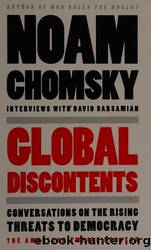Global Discontents: Conversations on the Rising Threats to Democracy by Chomsky Noam & Barsamian David

Author:Chomsky, Noam & Barsamian, David [Chomsky, Noam & Barsamian, David]
Language: eng
Format: epub
Tags: Politics, History, Philosophy, Sociology
ISBN: 9781250146182
Amazon: 1250146186
Goodreads: 33932359
Publisher: Metropolitan Books
Published: 2017-01-01T08:00:00+00:00
9
TOWARD A BETTER SOCIETY
CAMBRIDGE, MASSACHUSETTS (MARCH 11, 2016)
âSocialismâ was one of the most looked-up words in 2015, and several polls indicate that young people ages eighteen to twenty-nine have favorable views of socialism.1 Are you surprised by that?
Not so much surprised as uncertain. The question is what they mean by it. I suspect they mean something like social democracy, which is essentially New Deal welfare-state capitalism. And if thatâs the case, itâs not surprising, because polls have shown for years that this matches widely held goals of most of the population.
Youâve been involved in myriad struggles and actions over the decades. Are there any you feel have lessons for today?
Just about all of them. Take organizing poor people. The civil rights movement has plenty to teach about that, as does the labor movement. There are some common elements to all kinds of organizing; you have to find issues that meet several conditions. First, people have to care about them. Second, the fixes have to be feasible. And third, it has to be possible to convince people that they are feasible, because one of the major impediments to organizing is the feeling of âyou canât fight city hall.â So you have to show that you can fight city hall. The way itâs typically done in successful organizing is to find small things that people recognize could be achieved, see if you can achieve those, then encourage the sense that success is possible, and proceed to the next thing.
Take a real case that I heard of not long ago, about a group working in working-class immigrant communities in South Boston. At the beginning, just to break through the sense of hopelessness, they started with something very simple: women organized to see if they could get the town to put in a traffic light where their kids cross the road to go to school. They worked on the issue, they pressured local officials, and they won. Then they recognized that they could do things if they worked together. And they went on to the next campaign. Thatâs how you build. Thatâs organizing and activism.
Letâs talk about Latin America, a region historically under the U.S. thumb. Hugo Chávez was elected president of Venezuela in 1999. He was succeeded by Nicolás Maduro. Whatâs your evaluation of whatâs happened there?
Whatâs happened in Venezuela, first of all, is an extreme case of whatâs happening in Latin America generallyâand itâs pretty tragic. Chávez himself tried to create significant and positive changes, but the way he did it had fundamental flaws. For one thing, it was top-down. It was not coming from the base. There were some efforts to organize popular activism, but itâs very hard to find outâat least I havenât been able to find outâhow successful they were.
Then there was a significant amount of corruption and incompetence that seriously undermined his efforts. How high it went, we donât know. Finally, there was no real dent in the reliance of the economy on a single resource, oil. In fact, Venezuela probably became even more dependent on it.
Download
This site does not store any files on its server. We only index and link to content provided by other sites. Please contact the content providers to delete copyright contents if any and email us, we'll remove relevant links or contents immediately.
Women and Jewish Marriage Negotiations in Early Modern Italy by Howard Tzvi Adelman(445)
Warrior King by Wilbur Smith(418)
The Battle of Austerlitz by 50minutes(314)
18 real-life stories of serial killers and murderers with solved and unsolved killings from the USA, UK, Europe, and beyond. by Ben Oakley(304)
Violence and Emotions in Early Modern Europe by Susan Broomhall;Sarah Finn;(300)
The American Crisis by Unknown(294)
Who's Who in the Zulu War, 1879: The British by Adrian Greaves Ian Knight(293)
Youth, Heroism and War Propaganda: Britain and the Young Maritime Hero, 1745â1820 by D. A. B. Ronald(292)
The Seeker by S. G. MacLean(249)
The Origins of French Absolutism, 1598-1661 by Alan James(239)
The Traitor of Colditz by Robert Verkaik(234)
The Dutch East India Company and British East India Company: The History and Legacy of the Worldâs Most Famous Colonial Trade Companies by Charles River Editors(229)
The Thirty Years War â Complete by Friedrich Schiller(227)
Fires of Faith by Catholic England under Mary Tudor(223)
A Genius for Confusion by Richard M. Fried(220)
The Slave Trade in Africa by Simon Webb;(219)
Interest and Connection in the Eighteenth Century by Jacob Sider Jost(218)
Invisible Worlds by Peter Marshall(215)
Witchcraft in Early Modern England by James Sharpe(211)
